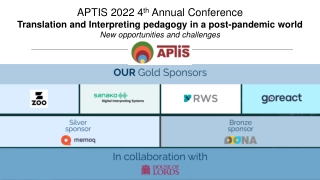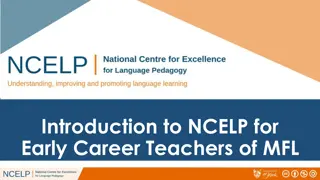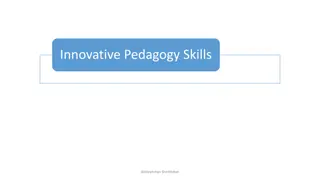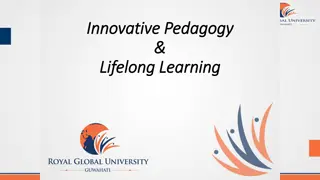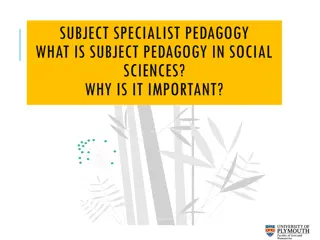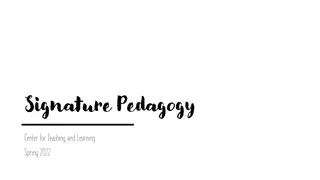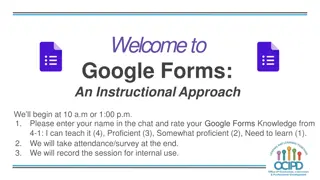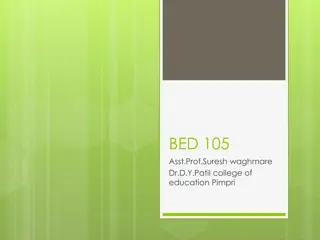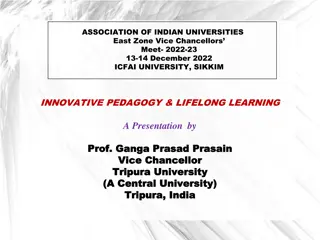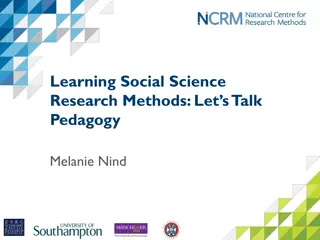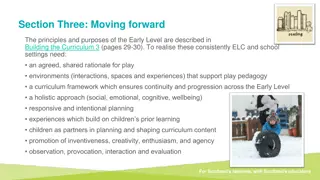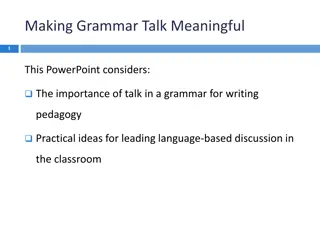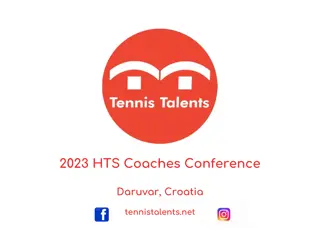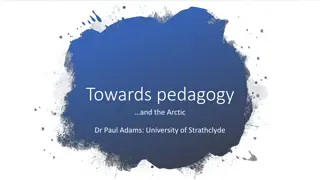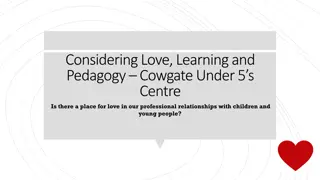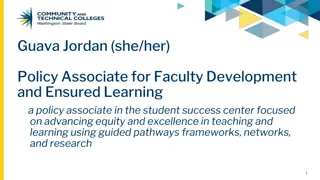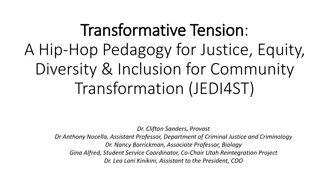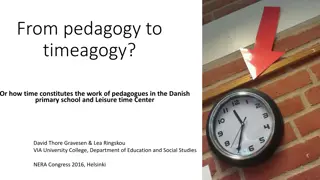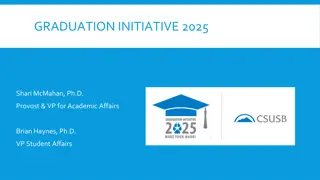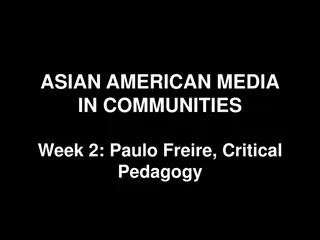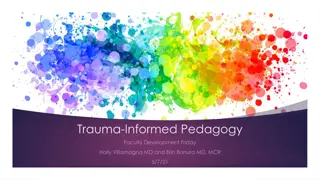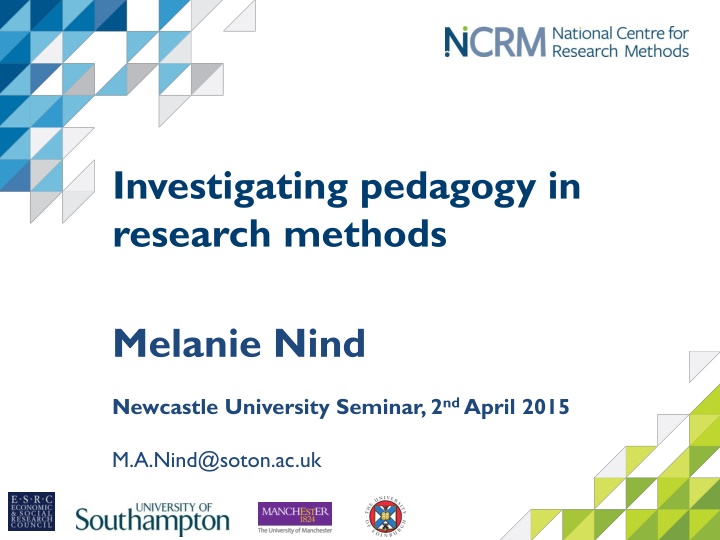
Pedagogy in Research Methods: Insights from Melanie Nind's Seminar at Newcastle University
Delve into the landscape of research methods pedagogy with findings, developments, and discussions from Melanie Nind's seminar at Newcastle University. Explore the UK and European contexts, along with insights from literature reviews on teaching research methods. Gain an understanding of the challenges and evolving practices in teaching research methods effectively.
Download Presentation

Please find below an Image/Link to download the presentation.
The content on the website is provided AS IS for your information and personal use only. It may not be sold, licensed, or shared on other websites without obtaining consent from the author. If you encounter any issues during the download, it is possible that the publisher has removed the file from their server.
You are allowed to download the files provided on this website for personal or commercial use, subject to the condition that they are used lawfully. All files are the property of their respective owners.
The content on the website is provided AS IS for your information and personal use only. It may not be sold, licensed, or shared on other websites without obtaining consent from the author.
E N D
Presentation Transcript
Investigating pedagogy in research methods Melanie Nind Newcastle University Seminar, 2ndApril 2015 M.A.Nind@soton.ac.uk
1. The landscape of research methods pedagogy 2. Findings to date 3. Developing pedagogical culture and dialogue around research methods 2
The landscape of research methods pedagogy
UK context ESRC concern with social science research capacity and global competitiveness Advent of ESRC Doctoral Training Centres Shift from apprenticeship/ supervision only to taught courses/formal training 4
Wider European Context Salzburg Principles fostering adoption of more structured forms of doctoral training Conception of doctoral learners as early stage researchers undergoing preparation for the job market Advocated by European University Association s (EUA) Council for Doctoral Education (Kottmann 2011) 5
The landscape according to the literature Wagner et al. (2011: 85): systematic review of lit 1997- 2007 concluded: There remains little evidence of a pedagogic culture for methods teaching (if the indicator is systematic debate through the literature or dialogue across disciplinary or methodological contexts, or if the indicator is a substantial research base substantial body of literature addressing the how to of research methods does not adequately inform the teaching of methods (Wagner et al, 2011: 75) 6
Earley (2013): more extensive synthesis of literature found mostly insights from particular instructors, courses, or institutions contributing little on how students actually learn research methods; teachers needing to rely on a network of peers, scattered research literature, and much trial-and-error for developing their practice (p.2) Kilburn, Nind & Wiles (2014): thematic review of 24 papers on how teachers facilitate methods learning found emerging pedagogical dialogue regarding teaching for active, experiential, and reflexive forms of learning 7
Two discourses One around doctoral education (with some pedagogic dialogue) One around training and capacity building (with a pedagogic void) 8
Research questions How do social science researchers learn about social research methods? How do teachers/trainers of research methods develop and use their methods-based and pedagogical knowledge for developing the methodological learning of others? 9
15 month study including: semi-structured interviews with specialists (n8) 3 focus groups with methods teachers (n14) online discussion forum with methods learners (n18) 4 video-stimulated focus groups with teachers & learners (n8+25) thematic, iterative analysis of combined dataset 11
Themes in the data (i) challenges re teaching and learning advanced or innovative methods (ii) teaching approaches used, valued or regarded as problematic (iii) pedagogical content knowledge (iv) innovation in methods for research / methods of teaching & learning (v) qualities of methods teachers/trainers & learners 12
Challenges Learner gaps/poor preparation Learner/context matches & mismatches Fearful learners, complex material Timing, sequencing, pace Learner diversity There are deficits or big gaps in the kind of [methodological] skills set that particularly Social Science undergraduates emerge from higher education with. For any kind of learning to be maximally beneficial, it has to occur at a point when you are likely to put it into practice. When I started my fieldwork it was a 'learn as you go' experience. Maybe that's the nature of it. 13
Approaches Motivating, guiding Maximizing dialogue/interaction Active, reflective, deep Embedded Maximizing use of materials (data) Self as resource critical appreciation, it s very much based on them then working through practice stimulating a sort of statistical imagination or thinking by that point we kind of knew each other well enough that it was really helpful doing this group work 14
PCK regarding material, sequence, strategies what is problematic what to include & what to leave out mix of input & inter/action balance of conceptual & operational, imagination & technique I think you re right, it s about holding my nerve as an organiser, and allowing there to be big blank space to sit there. I rail against the separation of [advanced training] from the research problem there s a sequence, so the order in which I show things in the software is not random 15
What emerges is picture of Pedagogical knowledge with references to experience and reflection as sources Some trial and error and gradual shaping of pedagogical approach (praxis) Use of evaluation data and feedback in the moment Teachers as learners and learners as teachers Some specialist language at teachers disposal, yet little reference to any pedagogical literature 16
But also apparent is Considerable pedagogical reflection when prompted Teachers and learners making good use of dialogic spaces for pedagogic discussion (created via different perspectives in tension) Not as simple as research methods instructors teach[ing] the way they were taught (Strayhorn 2009: 120) 17
Developing pedagogical culture and dialogue around research methods
Taken forward to the next study Enhancing methodological skills requires finely tuned learning experiences not just more TCB Pedagogical research can help develop a pedagogical culture for teaching research methods Tacit knowledge can be made explicit through dialogic processes (making it more amenable to development) Despite some oversimplified language of outputs, there is also scope for alternative rich storying (Todd, 2007: 84) of what is going on in methods teaching & learning for the individuals involved. 19
New research 2015-2017 Intended to create pedagogic dialogical spaces i.e. to open and sustain a dialogue between teachers of research methods, those concerned with providing advanced methods training to researchers, methodology researchers and learners of research methods. 20
Research design 2105-2017 Building from earlier national expert panel Building from earlier VSRR work Inter- national expert panel VSR dialogue Case studies Learner journeys Exploring how learners use materials & opportunities Method- ological & pedagogical innovation 21
Would you like to be involved? Would you like to take part in video-stimulated dialogue? Could you keep a diary of your research methods learning journey over 30 months? Are you doing something innovative with research methods or the teaching and learning of them? If so, make contact M.A.Nind@soton.ac.uk

